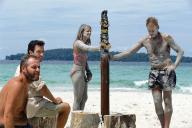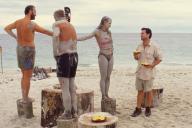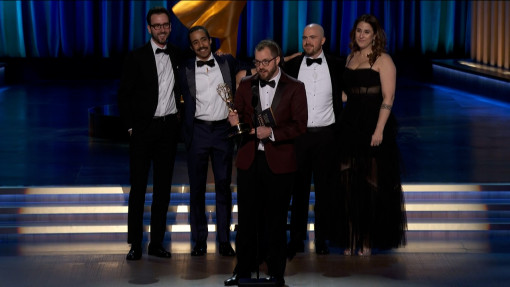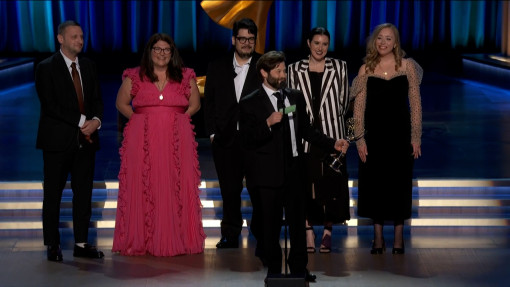For the past 15 years - and 30 seasons - Jeff Probst has delivered the word of the Tribe on CBS’s rock-steady reality hit, Survivor.
The current season finds him in Nicaragua, where castaways (as the contestants are known) have been split into theee tribes: White Collar, Blue Collar, and No Collar The winner will be revealed in the May finale.
Nearly 52 million viewers tuned in for the finale of season one, set in Borneo in 2000, which turned Probst into a hosting sensation.
Charismatic and unflappable, he had found his ideal job with the adventure show. Since that first season (remembered mostly for the penchant of the eventual winner, Richard Hatch, to parade naked), Probst has helped build a franchise that has taken viewers to the farthest reaches of the globe — and he's won four Emmys as outstanding reality host along the way.
"I'm pretty sure the reason I'm in front of the camera as much as I am is to be the final voice in the story," says Probst, who, along with Mark Burnett, is an executive producer on the series.
"It's more about control. No matter what happens, as the host on a show like Survivor, you get to be the guy that puts the cap on it."
Born in Wichita, Kansas, and raised in Bellevue, Washington, Probst grew up watching Johnny Carson and dreaming of a career in which he could hold audiences captive with his own storytelling.
As a teen, he lettered in golf, started an underground newspaper with friends and performed in a rock band.
But all along he knew that he wanted to work in the entertainment industry — he just didn't realize those ambitions would eventually deposit him in the African savannah, the Australian outback and the Amazon jungle — just to name a few locales — all the while refereeing scheming contestants as they competed in daring challenges.
Probst was interviewed in 2012 for the Television Academy Foundation's Archive of American Television. The following is an edited excerpt of that conversation; the full interview can be screened at TelevisionAcademy.com/archive.
Q: What interested you when you were growing up?
A: Telling stories. Once for Christmas I got a TV, with the express rule that I could not watch it after I went to bed.
But when the lights were off and my mom and dad were upstairs, I would turn on the TV — with the volume off — and watch Johnny Carson as he did his monologue. I couldn't hear it. But I became fascinated with the idea of him telling stories every night.
Q: What was your first job in the entertainment industry?
A: My very first job was at the Boeing Company. My dad got me the job. At the time Boeing had a massive film department — they made marketing and training videos.
I started as a production assistant. I knew nothing. I got to push buttons on editing machines and started doing some offline editing,
One day I said, "Could I write a script?" The next time I asked, "Could I produce the next one?" I had to hire a host to come and talk about the thing we were pitching. We paid him like S500.1 wasn't making $500 a week, maybe not a month.
I thought, "You got $500 for reading the words I wrote? And you just put on a suit?" So then I asked my boss, "Could I host one?" And he said, "Go for it." I hosted one and maybe a week later I got an agent. Then I got a job as the company's corporate video guy in Seattle.
Q: Were you a natural in front of the camera?
A: I think I was. I have a really good short-term memory. Terrible long-term memory, but I could remember four or five pages of dialogue. I think that made me valuable.
Q: What was your leap to a national platform?
A: I auditioned for FX, which at the time was a brand new network out of New York. Never thought I'd get the job, but the audition was fantastic — completely out of the box.
I was sitting in a room, and at a certain point they grabbed me and took me into another room where people were working. They handed me a mic and I was expected to make up something.
I started interviewing people in the office, pretending I was on a show. I thought I was terrible, but I got a call a couple days later and they said, "You're hired. Can you be in New York in three weeks?"
Q: What was the show?
A: It was Backchat, the final show of the night, designed to be a "letters to the editor" about the network, with people complaining about this or that.
But it turned out nobody was really watching FX — this was before The Shield — so nobody was writing to the network.
So we just made up letters. We would think of something funny to do, and then we'd write a letter. Like, "How do they make bagels?" Then we would go do a bagel shoot. I was getting paid to learn, It was crazy, but I got a check every two weeks.
Q: What were you learning?
A: That the best hosts first do their homework and then just be themselves,
Q: You then worked on Access Hollywood....
A: While I thought it wasn't a good spot for me, it was an interview I did for Access Hollywood that helped me get Survivor.
I had interviewed Sandra Bullock a few times. Every time someone interviews Sandra, she tries to give that interviewer something special, something she didn't give the other guy. I always felt like, "This is a decent person going out of her way."
At one interview, her blouse was unbuttoned kind of low, so I said, "Bullock's showing a lot of cleavage today." She said, "Why are you looking at my cleavage?" I said, "Why are you showing it to me?" Then she goes, "Well, unbutton yours." So I unbuttoned my shirt.
It was this silly little thing that never made the air. But I had a demo tape, and at the end were these 30 seconds with her.
Q: And that sealed the deal?
A: [Survivor executive producer] Mark Burnett said, "There were two reasons I picked you over the other guy. One was all your experience at FX. I knew that live TV would be important, because Survivor is basically a live show shot in the jungle. And two, the interview with Sandra Bullock. I thought that anybody who could have that kind of an exchange with a celebrity is the guy I want."
Q: How did you hear about Survivor?
A: I was driving on the 405 freeway in Los Angeles, and I heard Mark Burnett being interviewed on a radio show. He was saying that he was going to take 16 people and leave them on an island. They had to work together and, every three days, they would vote somebody off the island. At the end one person would get $1 million.
I was in the car thinking, "It's a brilliant concept — I've got to get in on this." I called my agent at William Morris and they said, "Well, CBS likes you, so we'll try to get you in."
Q: What happened next?
A: I was the first person to meet with Mark. I sat with him for almost two hours.
I had all this stuff prepared. I had anecdotes ready. If he brings up camping, I'll make up a story about camping. If he says, "Can you fish?" I'll say, "Oh, sure, I caught a huge fish." None of which would have been true.
Didn't matter. He talked for an hour and 45 minutes about his vision. He said, "It's this epic adventure. Arcing stories. Heroes and villains."
I'm enraptured. At the end he had said to me, "I don't think you can handle it. You're going to have rats crawling over you — we're going to be sleeping in tents," which we did.
That really tweaked me. I had like 15 minutes to impress him. I had a picture and resume there and I said, "This is not me." I ripped up my photo.
"I'm not a studio guy. I'm a writer. I've been in therapy. I get this show. I am the guy." It was this big, impassioned moment.
And Mark says, "Very nice to meet you." I leave and I'm thinking, "How can this be? I'm so connected to this show."
Q: And then?
A: A month goes by. Two, three months go by. I really can't believe it, because in my soul I knew this was the one. So I wrote four articles that imagined how this show was going to change the face of television.
One said, "Survivor sets a summer season viewing record."
"Survivor knocks Who Wants to Be a Millionaire off the air."
"Survivor makes [CBS president and CEO Leslie] Moonves so rich he buys his own island."
And every story ended with this line: "Experts say some of the success goes to the very likable but unknown Jeff Probst."
I sent the stories to Mark Burnett and to Ghen Maynard, who was the exec at CBS overseeing the show. I knew it was risky because it could come across as pushy or arrogant. But I really had nothing to lose. Then I got a call about three weeks later.
Q: What were your responsibilities in that first season?
A: Mark was clear from the beginning that he was hiring a host-producer. He said, "I'm going to tell you the story that I want to tell, and then you're going to go out and tell it." That's what we did.
When I first landed in the South China Sea, we went out on this little spit of sand in the ocean and walked for an hour while Mark talked. He said, "This is the show. This is the story."
He left, and a chopper flew overhead with a camera on it. I had a mic on, and I regurgitated a four-minute version of what he had just told me. That was my first test, When we got back, he watched the tape and said, "You get it. We're good to go."
Q: How soon into the first season did you realize you were working on something unique?
A: I knew when I saw the first piece of tape, and it showed [contestant] Richard Hatch sitting in a tree, and there was this [other contestant] Susan Hawk, who was a truck driver.
Richard had taken the power position. He already had his shirt off and he was saying, "I just think we should talk about this...." I couldn't believe I was on a show that was so cool, that was truly a sociological experiment where you're watching human behavior.
Q: How did you come up with the catchphrase "The tribe has spoken"?
A: I had a white board in the creative room, and I was trying to come up with the equivalent of, "Is that your final answer?" Millionaire was the rage at the time.
We had 40 sayings, and none of them were any good. We were down to two days before we were going to shoot and I was thinking, "Man, I can't just snuff out the torch. What am I going to say?"
I said to Mark, "Look, I hate to ask you this, but I feel like I need to say something at the end."
He said, "Yeah. Say, 'Obviously your tribe don't want you around no more.'"
I'm thinking, "That doesn't work." And he said, "Jeff, what do you want me to say? It's the way it is. The tribe has spoken."
Q: Where do you and the crew stay during production? Is it in tents or the Four Seasons?
A: Our locations vary depending on where we are. We have stayed in tents.
In the beginning we stayed in tents all the time. We were in tents in Kenya, in Africa, in the middle of all this wildlife. You'd unzip your tent in the morning one click at a time because you didn't want to scare off the zebra that were waiting outside.
Incredible. Same in Australia, when we filmed in the outback. There were kangaroo sitting right out there. You'd pick up the camera gear and shoot a TV show. It was nuts.
Q: In season one, in Borneo, Sue Hawk gave that dramatic speech at the tribal council, lambasting other contestants as rats and snakes, and then she lost. Do you wish for a Sue Hawk moment in every season?
A: No. To this day, there's always one person that tries to deliver that speech and no one's succeeded. Sue wasn't trying to be memorable — she was just speaking, and it really connected,
Q: In season three, in the Amazon, it was notable what Jenna Morasca and Heidi Strobel did for chocolate and peanut butter.
A: Yeah, the Amazon season is probably best known for the girls who got naked.
We had started these challenges that lasted all day, but then realized they were killing the production crew — you can't leave to go to the bathroom, you can't leave to eat, you're just sitting on the dock watching these people stand on a log in the middle of the ocean.
So somebody had the idea, "Why don't we tempt the contestants off the log — offer them something they really want?" One, it'll shorten the challenge, and two, story-wise, it will reveal who feels really safe.
Q: So what happened?
A: We started tossing around [incentives] — donuts, cold beer, peanuts. And Jenna and Heidi go, "We'll get naked for peanut butter and chocolate."
And as fast as I could say it, I'm breathing down into my microphone saying, "Get some peanut butter and chocolate."
It took 45 minutes for one of our guys in the boat to go back to base camp, get some peanut butter and chocolate from catering and get back. We had a great scene where they took their clothes off.
It was such a big deal — it's funny. In the middle of a contest with $1 million on the line, people got giddy that two women took their clothes off. It still makes me laugh.
Q: How long do you see yourself hosting Survivor?
A: I think I've got to host Survivor until it's over. How can I leave Mark and Les Moonves when they gave me this job? I think I'm at their beck and call.
But on the other hand, why would I leave? I still enjoy it. The only drag about the show is being away so long. That is hard.
I get homesick. I worry that my kids will forget what I look like. But I get through that, I get home and it's fine again.
Q: What would you like your legacy in television to be?
A: As a nice guy who helped tell stories.




























